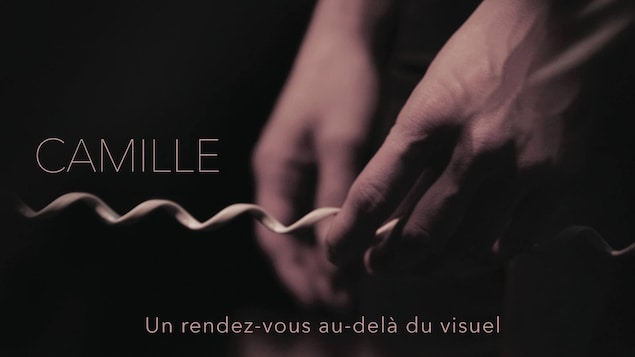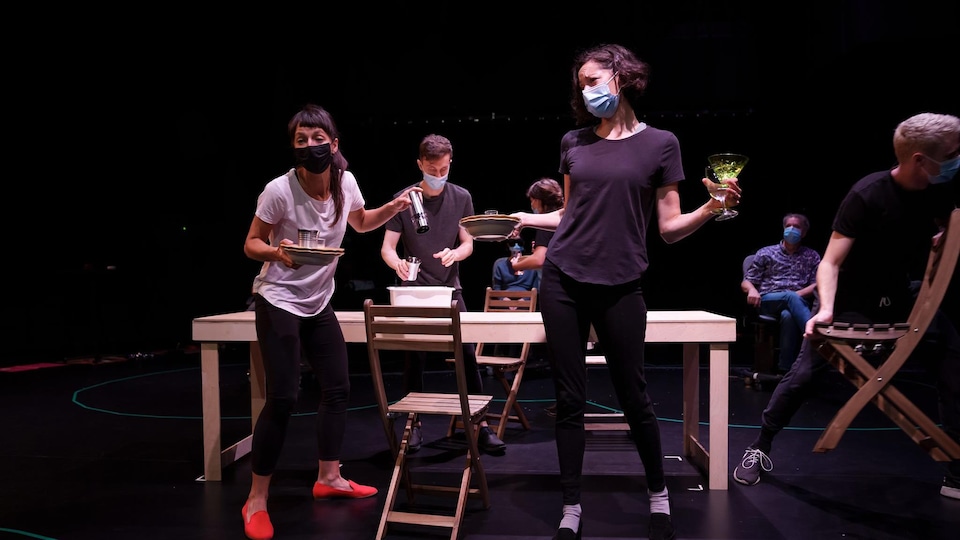She says you don’t make the same choices when you see or don’t see something. This idea of a different language inspired me.
Audrey-Anne Bouchard herself suffers from partial blindness. For her, adopting a different language means offering a theatrical experience to the visually impaired through touch, smell, and hearing.
Five years later, she performed this show nearly 40 times across the county. Audrey Ann Bouchard is proud to contribute to making art more accessible. His efforts paid off.
Last month, AlterGo, a Montreal-based organization that advocates for accessibility for all, gave her its annual award saying she has revolutionized the world of artistic and theater creativity.
Multi-sensory experience
Camille It is an immersive show that is performed in front of six people at a time. They sat on the stage, surrounded by actors and actresses recounting the adventures of the main character after the passing of his childhood friend, Camille.
The idea was to take the audience on a journey, says the 37-year-old designer. It is a multisensory experience in which we invite people to listen and interact with objects and smells.
COVID-19 and health restrictions forced her to make changes to the show. In the pre-pandemic version, the performers could dance with people from the audience rather than describe what was happening. In the latest version, the audience remains seated. The only contacts with actors and actresses are through something, like an umbrella.
Audrey Anne Bouchard has been blind since she was sixteen years old. When she started thinking about the concept of the show in 2016, she started wearing a mask that covered her eyes. If you create a show for the blind, you have to blind yourself, the designer assures. We do not make it to be seen, but to be felt.
Camille The piece was first presented in 2019. The piece has been supported by the Canadian Council on the Arts and the Montreal Council of the Arts, allowing it to be presented free of charge at many cultural centers.
Saturday will be the last performance until spring.
The play is also available for those who are not visually impaired, but sightseeers must wear a blindfold throughout the show.
A second show is in preparation
According to Audrey Anne Bouchard, Quebec is in favor of making art more accessible, and intends to push this enthusiasm even further. She is attending a second show in collaboration with other visually impaired artists.
in a CamilleI was the only one who was visually impaired, she said. It is important to me, in my development, to collaborate with visually impaired artists who have other experiences. This is the next challenge!
The general manager of Regroupement des Blind et Amblyopes du Montréal métropolitain, Pascal Dusseau, does not hesitate to pay tribute to Audrey Anne Bouchard. She points out that more places, such as museums and cinemas, are trying to accommodate the visually impaired.
I myself, have a visual impairment. It’s great to see that we’re starting to think we’re visually impaired too, and love the shows
, Scream.
Making art accessible to the visually impaired
But obstacles remain. France Dorette, 55, gradually lost her sight after contracting retinitis pigmentosa at age 25.
After losing his sight, he completely changed his relationship with the cultural scene. It became difficult for him to attend plays or visit exhibitions. When I heard about CamilleShe felt her disability was taken into account. She said she saw the play in August as a “fantastic experience”.
The show introduces another dimension to art. It’s not the same feeling. You really feel transported to the heart of the room described by the sounds and smells. Sitting on the stage is more interesting.
Ms. Dorit hopes more people will strive to make art accessible to the visually impaired. She never gives up on her desire to stay active.
We can’t stop living. Losing sight does not mean losing your mind. We must continue. Everything takes longer, and the days are longer. We have to learn to live with it.
For Audrey Anne Bouchard, Camille It was ultimately a self-discovery.
I realized that I always wanted to reassure people [sur le fait] My disability will not affect my work. with CamilleIt has become a strength, not an obstacle.

“Alcohol scholar. Twitter lover. Zombieaholic. Hipster-friendly coffee fanatic.”



